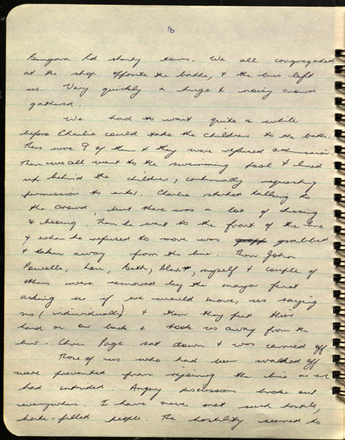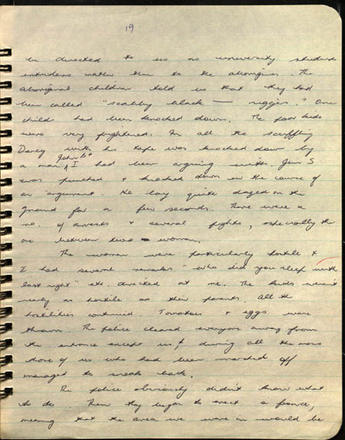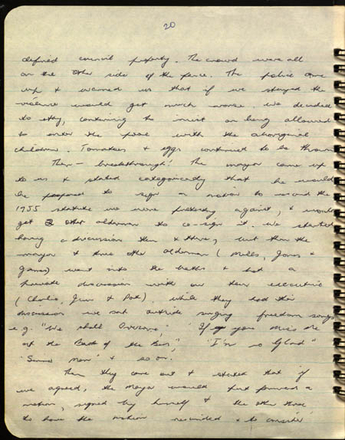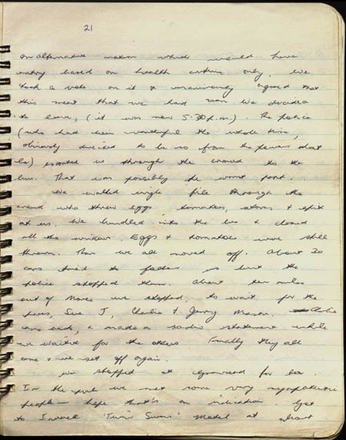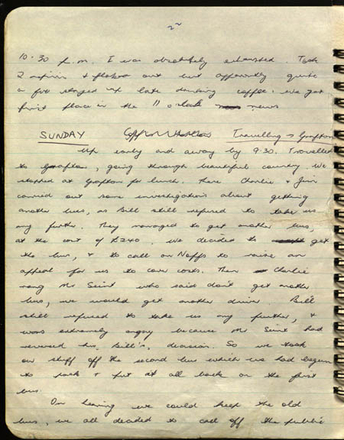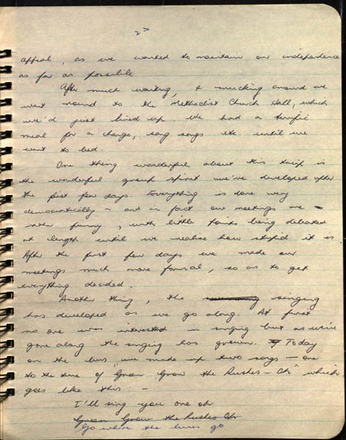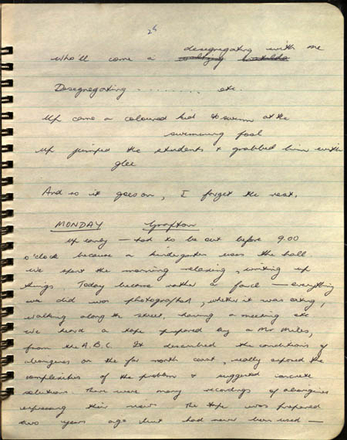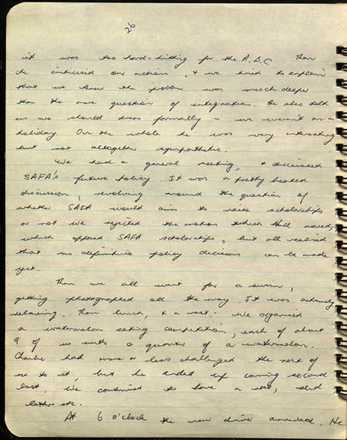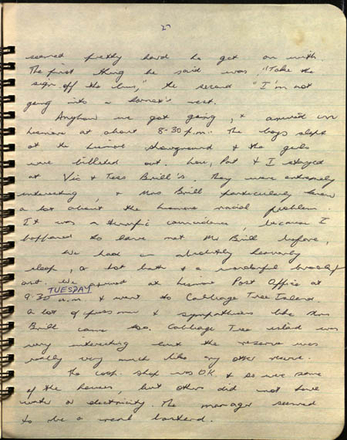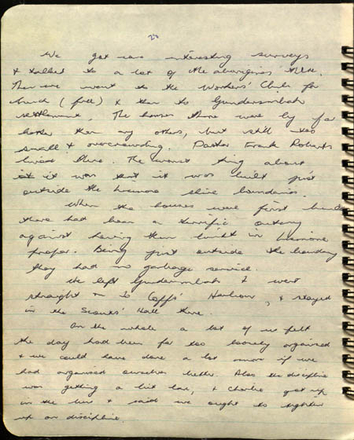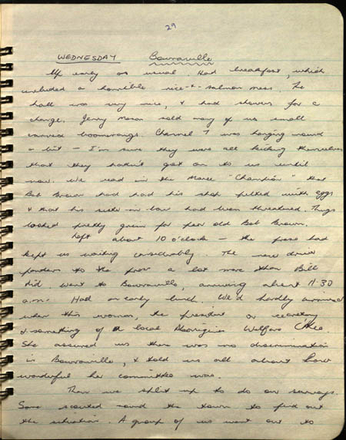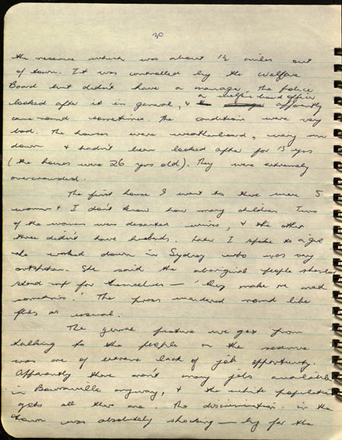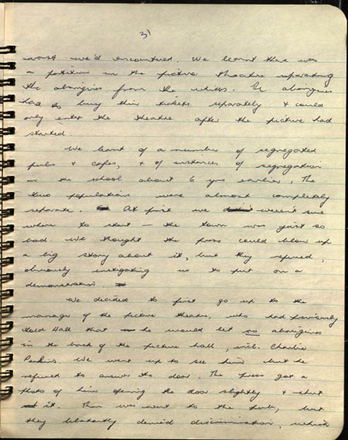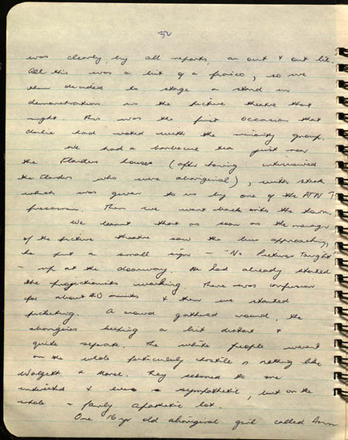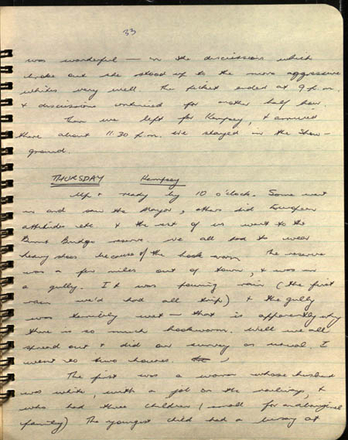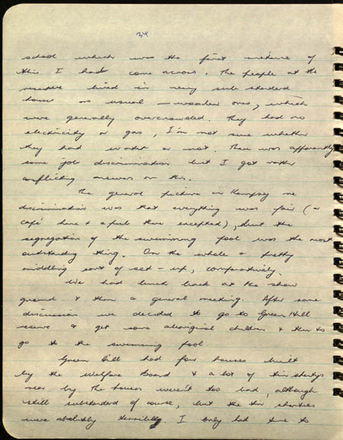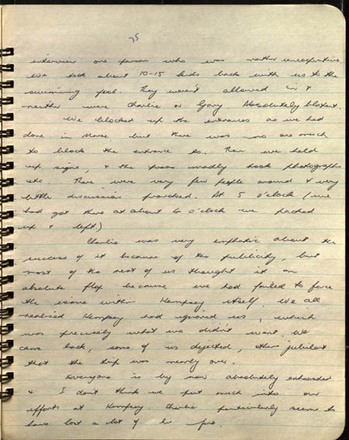Ann Curthoys' diaries have become an essential piece of historical material that tells the story of the 1965 Freedom Ride. Members of the Student Action for Aborigines (SAFA) organisation also produced many useful items that provide insight into this watershed moment in Australian history.
Aboriginal and Torres Strait Islander people should be aware that the Freedom Ride documents include names and images of deceased people in photographs and in print.
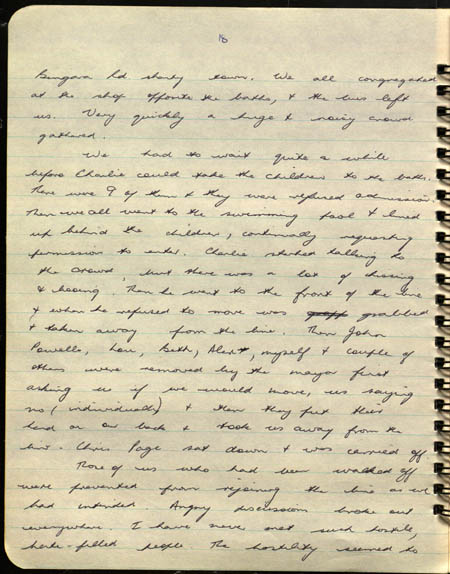
Bingara Rd shanty town. We all congregated at the shop opposite the baths, and the bus left us. Very quickly a huge and noisy crowd gathered.
We had to wait quite a while before Charlie could take the children to the baths. There were 9 of them and they were refused admission. Then we all went to the swimming pool and lined up behind the children, continually requesting permission to enter, Charlie started talking to the crowd, but there was a lot of hissing and booing. Then he went to the front of the line and when he refused to move was grabbed and taken away from the line. Then John Powell, Lou, Beth, Alex, myself and a couple of others were removed by the mayor first asking us if we would move, us saying no (individually) and then they put their hand on our back and took us away from the line. Chris Page sat down and was carried off. Those of us who had been walked off were prevented from rejoining the line as we had intended. Angry discussion broke out everywhere. I have never met such hostile, hate-filled people. The hostility seemed to...
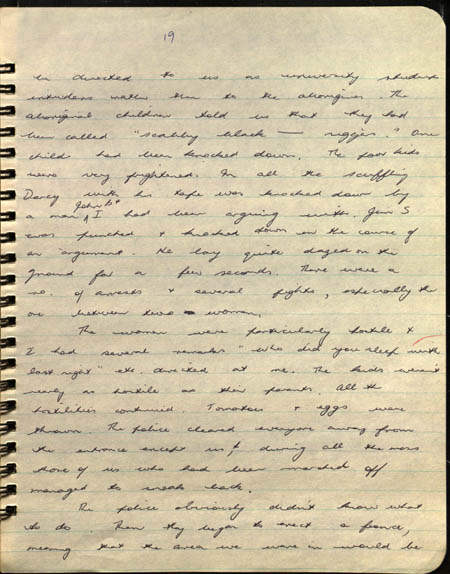
... be directed at us as university student intruders rather than to the aborigines. The aboriginal children told us that they had been called "scabby black ------ niggers" . One child had been knocked down. The poor kids were very frightened. In all the scuffling Darcy with his tape was knocked down by a man John B and I had been arguing with. Jim S was punched and knocked down in the course of an argument. He lay quite dazed on the ground for a few seconds. There were a number of arrests and several fights, especially the one between two women.
The women were particularly hostile and I had several remarks "Who did you sleep with last night" etc directed at me. The kids weren't nearly as hostile as they parents. All the hostilities continued. Tomatoes and eggs were thrown. The police cleared everyone away from the entrance except us, and during all the mess those of us who had been marched off managed to sneak back.
The police obviously didn't know what to do. Then they began to erect a fence, meaning that the area we were in would be...
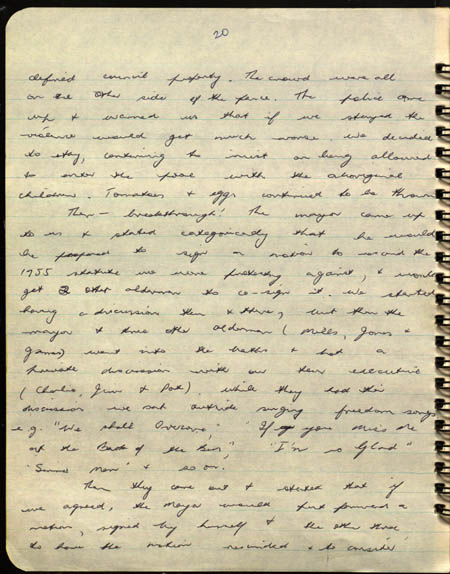
defined council property. The crowd were all on the other side of the fence. The police came up and warned us that if we stayed the violence would get much worse. We decided to stay, continuing to insist on being allowed to enter the pool with the aboriginal children. Tomatoes and eggs continued to be thrown.
Then - breakthrough! The mayor came up to us and stated categorically that he would be prepared to sign a motion to rescind the 1955 statute we were protesting against, and would get two other aldermen to co-sign it. We started having a discussion then and there, but then the mayor and three other aldermen (Mills, Jones, and James) went into the baths and had a private discussion with our tour executive (Charlie, Jim, and Pat). While they had their discussion we sat outside singing freedom songs, e.g. "We shall Overcome", "If you Miss Me at the Back of the Bus", "I'm so Glad", "Sinner Man" and so on.
Then they came out and stated that if we agreed, the Mayor would put forward a motion, signed by himself and the other three, to have the motion rescinded and to consider
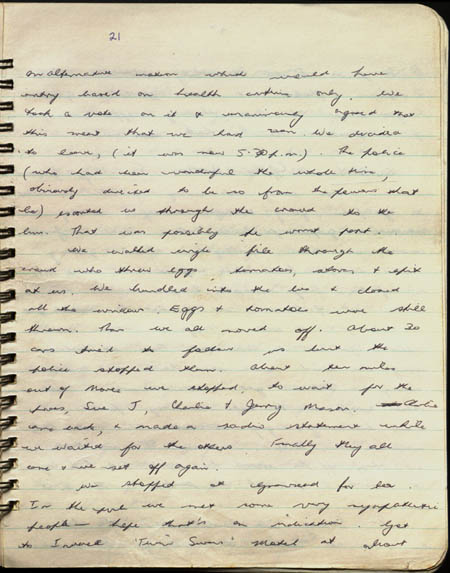
...an alternative motion which would have entry based on health criteria only. We took a vote on it and unanimously agreed that this meant that we had won. We decided to leave (it was now 5.30 pm). The police (who had been wonderful the whole time, obviously directed to be so from the powers that be ) escorted us through the crowd to the bus. That was possibly the worst part.
We walked single file though the crowd who threw eggs, tomatoes, stones, and spat at us. We bundled into the bus and closed all the windows. Eggs and tomatoes were still thrown. Then we all moved off. About 30 cars tried to follow us but the police stopped them. About ten miles out of Moree we stopped, to wait for the press, Sue J, Charlie and Jerry Mason. Charlie came back, and made a radio statement while we waited for the others. Finally they all came and we set off again.
We stopped at Gravesend for tea. In the pub we met some very sympathetic people - hope that's an indication. Got to Inverell "Twin Swans" Motel at about...
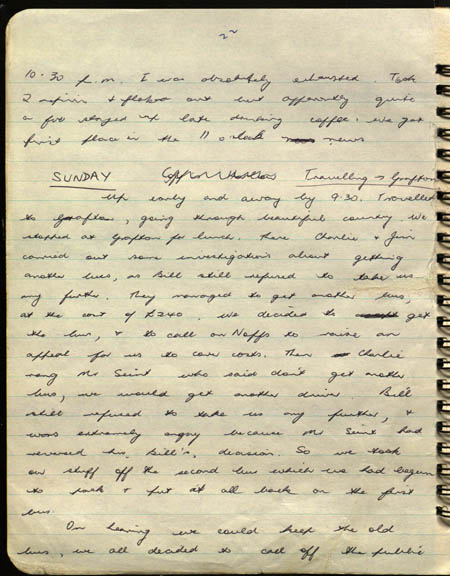
...10.30 pm. I was absolutely exhausted. Took 2 aspirin and flaked out but apparently quite a few stayed up late drinking coffee. We got first place in the 11 o'clock news.
Sunday Travelling
Up early and away by 9.30. Traveled to Grafton, going through beautiful country. We stopped at Grafton for lunch. There Charlie and Jim carried out some investigations about getting another bus, as Bill still refused to take us any further. They managed to get another bus, at the cost of 240 pounds. We decided to get the bus, and to call on Noffs to raise an appeal for us to cover costs. Then Charlie rang Mr Seint who said don't get another bus, we would get another driver. Bill still refused to take us any further, and was extremely angry because Mr Seint had reversed his, Bill's, decision. So we took our stuff off the second bus which we had begun to pack and put it all back on the first bus.
On hearing we could keep the old bus, we all decided to call off the public...
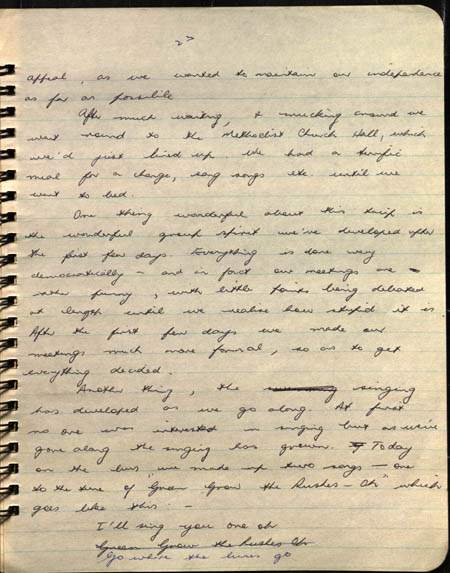
...appeal, as we wanted to maintain our independence as far as possible.
After much waiting, and mucking around we went round to the Methodist Church Hall, which we'd just lined up. We had a terrific meal for a change, sang songs etc. until we went to bed.
One thing wonderful about this trip is the wonderful group spirit we've developed after the the first few days. Everything is done very democratically and in fact our meetings are rather funny, with little points being debated at length until we realise how stupid it is. After the first few days we made our meetings much more formal, so as to get everything decided.
Another thing, the singing has developed as we go along. At first no one was interested in singing but as we've gone along the singing has grown. Today on the bus we made up two songs - one to the tune of "Green Grow the Rushes - Oh" which goes like this:
I'll sing you one oh
Go where the buses go...
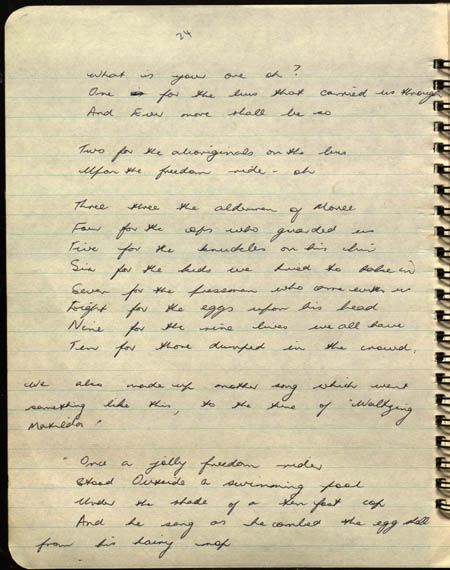
...What is your one oh?
One for the bus that carried us through
And ever more shall be so.
Two for the aboriginals on the bus
Upon the freedom ride - oh
Three three the aldermen of Moree
Four for the cops who guarded us
Five for the knuckles on his chin
Six for the kids we tried to take in
Seven for the pressmen who came with us
Eight for the eggs upon his head
Nine for the nine lives we all have
Ten for those dumped in the crowd.
We also made up another song which went something like this, to the tune of "Waltzing Matilda":
Once a jolly freedom rider
Stood outside a swimming pool
Under the shade of a ten foot cop
And he sang as he combed the egg shell from his hairy mop...
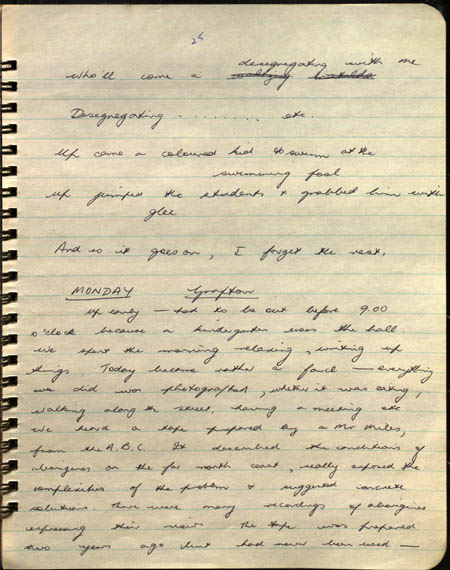
...Who'll come a desegregating with me
Desegregating........ etc
Up came a coloured kid to swim at the swimming pool
Up jumped the students and grabbed him with glee
And so it goes on, I forget the rest.
Monday Grafton
Up early - had to be out before 9.00 o'clock because a kindergarten uses the hall. We spent the morning relaxing, writing up things. Today became rather a farce - everything we did was photographed, whether it was eating, walking along the street, having a meeting, etc. We heard a tape prepared by a Mr Miles, from the ABC. It described the conditions of aborigines on the far north coast, really exposed the complexities of the problem and suggested concrete solutions. There were many recordings of aborigines expressing their views. The tape was prepared two years ago but had never been used -...
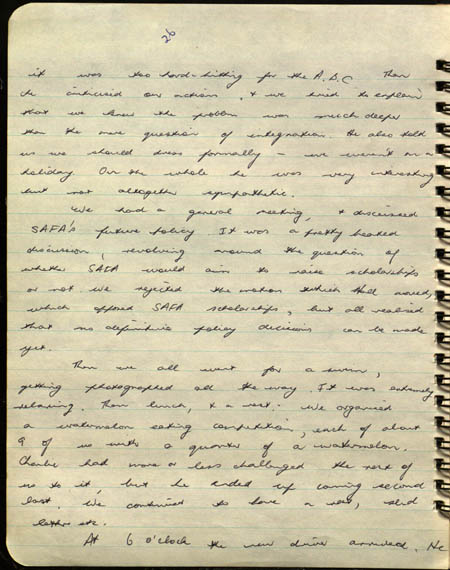
... it was too hard-hitting for the ABC. Then he criticised our actions and we tried to explain that we knew the problem was much deeper than the mere question of integration. He also told us we should dress formally - we weren't on a holiday. On the whole he was very interesting but not altogether sympathetic.
We had a general meeting, and discussed SAFA's future policy. It was a pretty heated discussion, revolving around the question of whether SAFA would aim to raise scholarships or not. We rejected the motion which Hall moved, which opposed SAFA scholarships, but all realised that no definitive policy decisions can be made yet.
Then we all went for a swim, getting photographed all the way. It was extremely relaxing. Then lunch, and a rest. We a organised a watermelon eating competition, each of about nine of us with a quarter of a watermelon. Charlie had more or less challenged the rest of us to it, but he ended up coming second last. We continued to have a rest, send letters, etc.
At 6 o'clock the new driver arrived. He ...
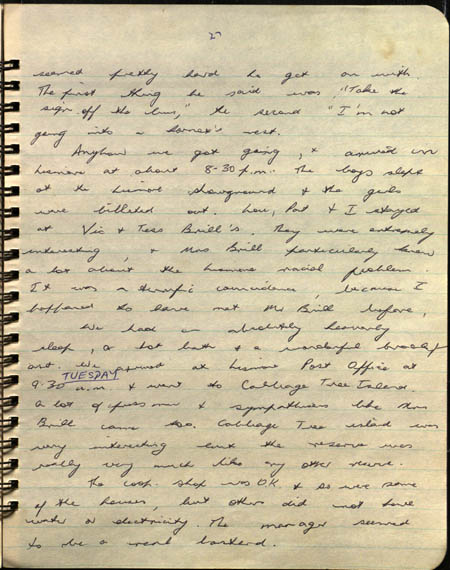
...seemed pretty hard to get on with. The first thing he said was "Take the sign off the bus", the second "I'm not going into a hornet's nest".
Anyhow we got going, and arrived in Lismore at about 8.30pm. The boys slept at the Lismore showground and the girls were billeted out. Lou, Pat, and I stayed at Vic and Tess Brill's. They were extremely interesting and Mrs Brill particularly knew a lot about the Lismore racial problem. It was a terrific coincidence, because I happened to have met Mr Brill before.
We had an absolutely heavenly sleep, a hot bath and a wonderful breakfast. We arrived at Lismore Post Office at 9.30 am., and went to Cabbage Tree Island. A lot of press men and sympathisers like Mrs Brill came too. Cabbage Tree Island was very interesting but the reserve was really very much like any other reserve.
The coop. shop was OK and so were some of the houses, but others did not have water or electricity. The manager seemed to be a real bastard.
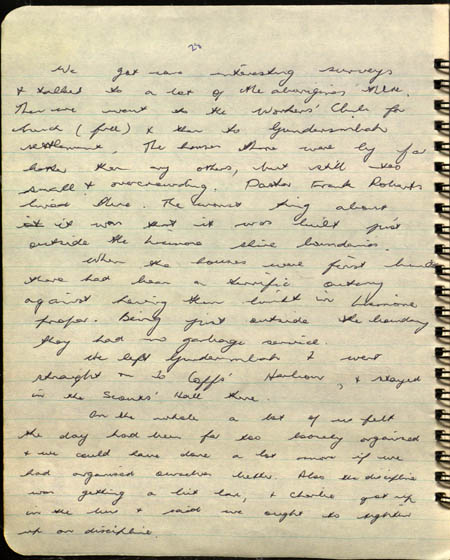
..We got some interesting surveys and talked to a lot of the aborigines there. Then we went to the Workers' Club for lunch (free) and then to Gunderimbah settlement. The houses there were by far better than any others, but still too small and overcrowded. Pastor Frank Roberts lived there. The worst thing about it was that it was built just outside the Lismore shire boundaries. When the houses were first built there had been a terrific outcry against having them built in Lismore proper. Being just outside the boundary they had no garbage service.
We left Gunderimbah and went straight on to Coff's Harbour, and stayed in the Scouts' Hall there.
On the whole a lot of us felt the day had been far too loosely organised and we could have done a lot more if we had organised ourselves better. Also the discipline was getting a bit lax, and Charlie got up in the bus and said we ought to tighten up on discipline.
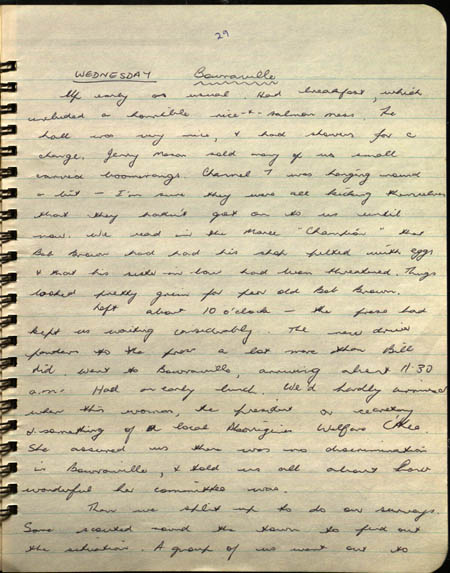
Wednesday Bowraville
Up early as usual. Had breakfast, which included a horrible rice and salmon mess. The hall was very nice, and had showers for a change. Jerry Mason sold many of us small carved boomerangs. Channel 7 was hanging round a bit - I'm sure they were all kicking themselves that they hadn't got on to us until now. We read in the Moree "Champion" that Bob Brown had had his shop pelted with eggs and that his sister in law had been threatened. Things looked pretty grim for poor old Bob Brown.
Left about 10 o'clock - the press had kept us waiting considerably. The new driver panders to the press a lot more than Bill did. Went to Bowraville, arriving about 11.30 am. Had an early lunch. We'd hardly arrived when this woman, the president or secretary or something of a local Aborigines Welfare Committee, assured us there was no discrimination in Bowraville, and told us all about how wonderful her committee was.
Then we split up to do our surveys. Some scouted round the town to find out the situation. A group of us went out to...
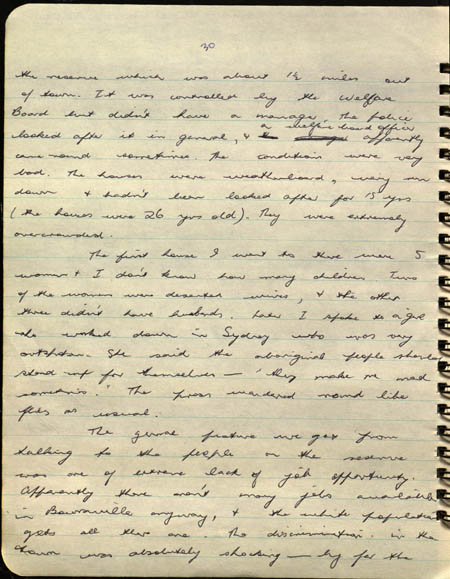
...the reserve which was about one and a half miles out of town. It was controlled by the Welfare Board but didn't have a manager. The police looked after it in general, and a welfare board officer apparently came round sometimes. The conditions were very bad. The houses were weatherboard, very run down, and hadn't been looked after for 15 years (the houses were 26 years old). They were extremely overcrowded.
The first house I went to there were 5 women and I don't know how many children. Two of the women were deserted wives, and the other three didn't have husbands. Later I spoke to a girl who worked down in Sydney who was very outspoken. She said the aboriginal people should stand up for themselves - "they make me mad sometimes". The press wandered around like flies as usual.
The general picture we got from talking to the people on the reserve was one of extreme lack of job opportunity. Apparently there aren't many jobs available in Bowraville anyway, and the white population gets all there are. The discrimination in the town was absolutely shocking - by far the...
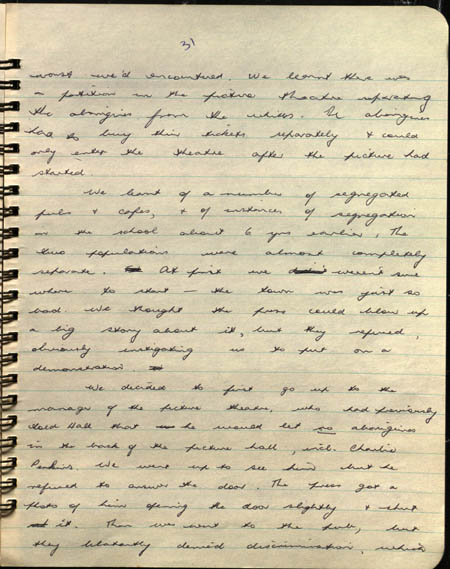
...worst we'd encountered. We learnt there was a partition in the picture theatre separating the aborigines from the whites. The aborigines had to buy their tickets separately and could only enter the theatre after the picture had started.
We learnt of a number of segregated pubs and cafes, and of instances of segregation in the school about 6 years earlier. The two populations were almost completely separate. At first we weren't sure where to start - the town was just so bad. We thought the press could blow up a big story about it, but they refused, obviously instigating us to put on a demonstration.
We decided to first go up to the manager of the picture theatre, who had previously told Hall that he would let no aborigines in the back of the picture had, including Charlie Perkins. We went up to see him but he refused to answer the door. The press got a photo of him opening the door slightly and shut it. Then we went to the pub, but they blatantly denied discrimination, which...
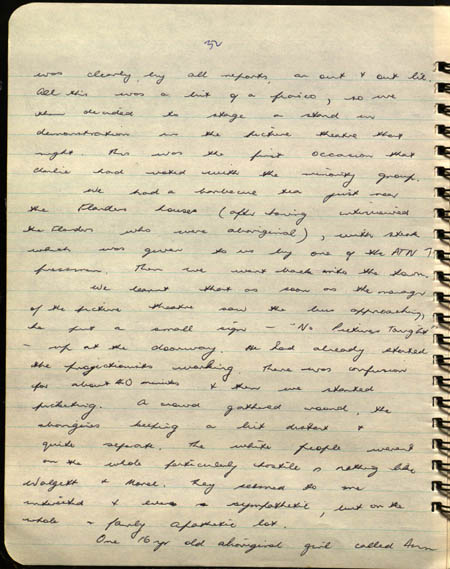
...was clearly, by all reports, an out and out lie. All this was a bit of a fiasco, so we then decided to stage a stand in demonstration in the picture theatre that night. This was the first occasion that Charlie had voted with the minority group.
We had a barbecue tea just near the Flanders houses (after having interviewed the Flanders who were aboriginal), with stake which was given to us by one of the ATN 7 pressmen. Then we went back into the town.
We learnt that as soon as the manager of the picture theatre saw the bus approaching he put a small sign - "No Pictures Tonight" - up at the doorway. He had already started the projectionists working. There was confusion for about 40 minutes and then we started picketing. A crowd gathered round, the aborigines keeping a bit distant and quite separate. The white people weren't on the whole particularly hostile, nothing like Walgett and Moree. They seemed to me interested and even sympathetic, but on the whole a fairly apathetic lot.
One 16 year old aboriginal girl called Ann...
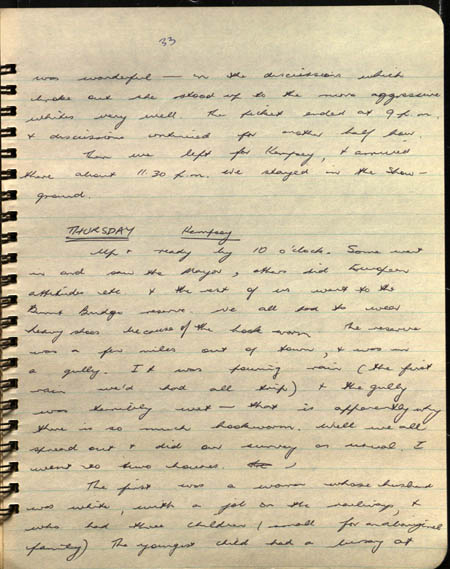
Ann was wonderful - in the discussions which broke out she stood up to the more aggressive whites very well. The picket ended at 9 pm, and discussions continued for another half hour.
Then we left for Kempsey, and arrived there about 11.30 pm. We stayed in the Showground.
Thursday Kempsey
Up and ready by 10 o'clock. Some went in and saw the Mayor, others did European attitudes etc. and the rest of us went to the Burnt Bridge Reserve. We all had to wear heavy shoes because of the hook worm. The reserve was a few miles out of town, and was in a gully. It was pouring rain (the first rain we'd had all trip) and the gully was terribly wet - that is apparently why there is so much hookworm. We all spread out and did our survey as usual. I went to two houses.
The first was a woman whose husband was white, with a job on the railways, and who had three children (small for an aboriginal family). The youngest child had a bursary at...
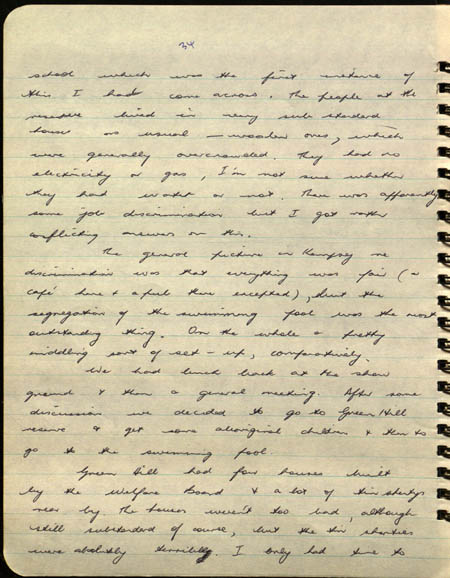
...school which was the first instance of this I had come across. The people at the reserve lived in very sub standard houses as usual - wooden ones, which were generally overcrowded. They had no electricity or gas, I'm not sure whether they had water or not. There was apparently some job discrimination but I got rather conflicting answers on this.
The general picture in Kempsey re discrimination was that everything was fair (a cafe here and a pub there excepted), but the segregation of the swimming pool was the most outstanding thing. On the whole a pretty middling sort of set up comparatively.
We had lunch back at the show ground and then a general meeting. After some discussion we decided to go to Green Hill reserve and get some aboriginal children and then to go to the swimming pool.
Green Hill had four houses built by the Welfare Board and a lot of tin shanties near by. The houses weren't too bad, although still substandard of course, but the tin shanties were absolutely terrible. I only had time to...
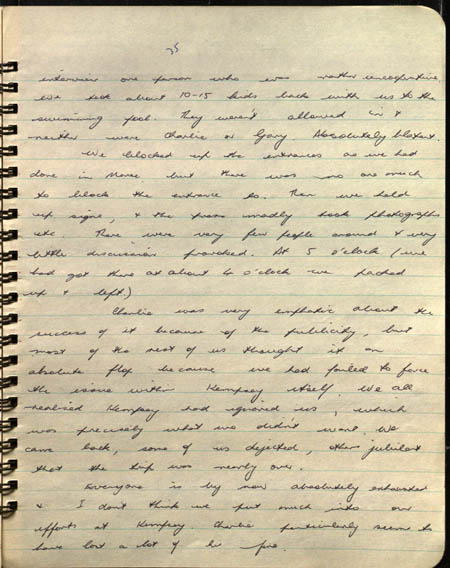
...interview one person who was rather uncooperative. We took about 10-15 kids with us to the swimming pool. They weren't allowed in and neither were Charlie or Gary. Absolutely blatant.
We blocked up the entrances as we had done in Moree but there was no one much to block the entrance to. Then we held up signs, and the press madly took photographs etc. There were very few people around and very little discussion provoked. At 5 o'clock (we had got there at 2 o'clock) we packed up and left.
Charlie was very emphatic about the success of it because of the publicity, but most of the rest of us thought it an absolute flop because we had failed to force the issue within Kempsey itself. We all realised Kempsey had ignored us, which was precisely what we didn't want. We came back, some of us dejected, others jubilant that the trip was nearly over.
Everyone is by now absolutely exhausted and I don't think we put much into our efforts at Kempsey. Charlie particularly seems to have lost a lot of his fire.
